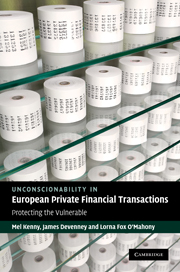Book contents
- Frontmatter
- Contents
- List of contributors
- Introduction: conceptualising unconscionability in Europe
- PART I Conceptualising unconscionability
- PART II Conceptualising unconscionability in financial transactions
- 8 Usury and the judicial regulation of financial transactions in seventeenth- and eighteenth-century England
- 9 Protection of the vulnerable in financial transactions – what the common law vitiating factors can do for you
- 10 Borrowers as consumers: new notions of unconscionability for domestic borrowers
- 11 Conceptualising and understanding fairness: lessons from and for financial services
- 12 Open the box: an exploration of the Financial Services Authority's model of fairness in consumer financial transactions
- 13 Conceptualising unconscionability in the context of risky financial transactions: how to converge public and private law approaches?
- 14 Conceptualising unconscionability in the post-Soviet era: the Lithuanian case of legal transplants
- 15 Bank loan contracts in Polish law: the legal position of the borrower
- 16 Financial contracts and ‘junk title’ purchases: a matter of (in)correct information
- 17 Kickback payments under MiFID: substantive or procedural standard of unconscionability?
- 18 Unfairness under the Consumer Protection from Unfair Trading Regulations 2008
- Conclusions
- Index
- References
12 - Open the box: an exploration of the Financial Services Authority's model of fairness in consumer financial transactions
from PART II - Conceptualising unconscionability in financial transactions
Published online by Cambridge University Press: 06 August 2010
- Frontmatter
- Contents
- List of contributors
- Introduction: conceptualising unconscionability in Europe
- PART I Conceptualising unconscionability
- PART II Conceptualising unconscionability in financial transactions
- 8 Usury and the judicial regulation of financial transactions in seventeenth- and eighteenth-century England
- 9 Protection of the vulnerable in financial transactions – what the common law vitiating factors can do for you
- 10 Borrowers as consumers: new notions of unconscionability for domestic borrowers
- 11 Conceptualising and understanding fairness: lessons from and for financial services
- 12 Open the box: an exploration of the Financial Services Authority's model of fairness in consumer financial transactions
- 13 Conceptualising unconscionability in the context of risky financial transactions: how to converge public and private law approaches?
- 14 Conceptualising unconscionability in the post-Soviet era: the Lithuanian case of legal transplants
- 15 Bank loan contracts in Polish law: the legal position of the borrower
- 16 Financial contracts and ‘junk title’ purchases: a matter of (in)correct information
- 17 Kickback payments under MiFID: substantive or procedural standard of unconscionability?
- 18 Unfairness under the Consumer Protection from Unfair Trading Regulations 2008
- Conclusions
- Index
- References
Summary
Introduction
The first global financial crisis of the twenty-first century has fuelled extensive debate about the regulation of financial markets and transactions. Although much of this debate so far has focused on the inter-firm and intra-group dealings among financial firms that the crisis has exposed as sites of systemic risk, the catalytic effects of the insecurities and vulnerabilities experienced by sub-prime borrowers in the US and by Northern Rock savers in the UK has given new prominence to the regulation and governance of personal financial transactions. Responding to the urgency of the perceived need to strengthen consumer confidence in banks, European jurisdictions moved swiftly to shore up depositor compensation funds, increase coverage limits and eliminate co-insurance requirements, apparently with little regard to the moral hazard consequences of such measures.
Other consumer-oriented proposals for the new regulatory order include financial product safety regulation, additional information sharing and disclosure measures, further development of responsible lending standards, and the activation of the self-protective capacities of financial consumers through financial education and advice and, where possible, carefully crafted default rules.
Many such proposals build on the regulatory foundation that has been laid by the Financial Services Authority (FSA), the UK's main market regulator of consumer financial markets and products. Despite operating for most of its short life in an environment that celebrated ‘light-touch’ regulation, the FSA has nonetheless created an innovative model of fair dealing in consumer financial transactions.
- Type
- Chapter
- Information
- Unconscionability in European Private Financial TransactionsProtecting the Vulnerable, pp. 227 - 245Publisher: Cambridge University PressPrint publication year: 2010
References
- 1
- Cited by



